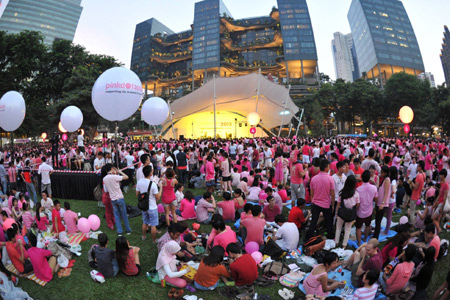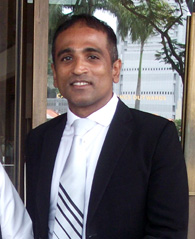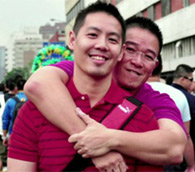I've been to every Pink Dot for the past five years, watching it grow from crowds of 2,500 in 2009 to 21,000 in 2013. I'm still awed by the glorious sight of pink people all streaming onto Hong Lim Park to declare their support for the freedom to love. This year, the 21,000-strong crowd was a record of public solidarity not just for Pink Dot, but for Hong Lim Park, pushing at the boundaries of democratic space in Singapore. And, as we sang and waved our pink torches, celebrating this all-round joyous picnic, costume party and political statement, one could almost think we were a big family.

Photo courtesy of Pink Dot
Perhaps we are. And like family, as with all other social groups, there are squabbles, blind spots, exclusions, privileges of one over the other. And like families constantly testing their bonds, I believe a movement must grow big enough to clash, to accept questions, diversity in discourse and even internal contradictions. Here is one example:
At Pink Dot this year, couple Gary Lim and Kenneth Chee were introduced as its flag-bearers, in celebration of their December 2012 constitutional challenge of 377A, the law that continues to criminalise consensual homosexual acts between adult men in Singapore. The crowd cheered. They've got strong community support, and rightly so.
Yet, as we thanked the brave couple, no one mentioned Tan Eng Hong, who first filed his constitutional challenge to section 377A on 24 September 2010, nor his lawyer M Ravi, who has doggedly championed many human rights cases in Singapore.
Strategically, this avoidance makes sense. Initially charged under section 377A for sex in a public toilet (with a consenting man), Tan Eng Hong is no poster boy for the gay community. Commenting on Tan's case in 2010, People Like Us (PLU) stated that they "do not condone sex in public spaces where conflict with other members of society can occur" (emphasis added), and also pointed out that "should the State wish to prosecute, it should do so using gender-neutral laws", for example, public obscenity laws. This view was also accepted by Tan, who pleaded guilty to the amended charge of public obscenity, before he launched a constitutional challenge against the original 377A charge.


Top: M Ravi, Tan Eng Hong's lawyer. Gary Lim and Kenneth Chee.
The problem is, gay men are already unfairly associated with paedophiles, rapists, molesters etc, and constantly have to point out the basic difference. In this light, it is completely understandable that most people would not want to rally behind the complicated message of Tan's case. This may be further hampered by certain personal or ideological differences between Tan, M Ravi, and the LGBTQ community. Better then, to hold up the sweetness of Gary and Kenneth's fifteen-year relationship for everyone to unequivocally cheer and support.
But we cannot ignore the value of Tan Eng Hong's case, and the resultant benefits to the community. In their fund-raising video, Gary said: "[The government] said they would not actively enforce the law, but Tan Eng Hong [being] arrested under 377A shows that we will never know when they will enforce the law, and it will be a constant threat to all gay people." Although PM Lee Hsien Loong had asserted during the 2007 Parliamentary debates that "we do not proactively enforce Section 377A", it was Tan's initial charge under 377A in 2010 which highlighted that 377A is still "alive and kicking", in the words of Justice Judith Prakesh, during Tan's appeal court hearing in September 2011.
Furthermore, it was Tan’s case which confirmed that Gary and Kenneth had locus standi in theirs. In the Court of Appeal's 21 August 2012 ruling on Tan's case, it was established that all gay men have locus standi to challenge 377A without needing to be charged under the law, due to "a real and credible threat of prosecution under this allegedly unconstitutional law" (see point 115), and also since "377A is arguably inconsistent with Article 12 [of the Constitution]" (see point 122 of "Tan Eng Hong v Attorney-General [2012] SGCA 45").
Gary also directly acknowledged the significance of Tan's case in their decision to file a challenge, saying: "After reading the court of appeal judgment on Tan Eng Hong, we decided that we could do our part to represent the gay community as a gay couple of fifteen years, and hopefully the law can be repealed, and we can all move on."
At Pink Dot 2013, with the emcee and crowd cheering Gary and Kenneth, without so much as a simple thanks to Tan Eng Hong and lawyer M Ravi, there is perhaps the subconscious justification that we can best counter 377A's discrimination by rallying behind the “acceptable ones”, and excluding the “complicated ones” who may taint our hard-won image of respectability, social normalcy and morality. It is a smart strategy, but one with a human cost.
Addressing their friends and supporters, Gary said: "With that support, we felt a lot better that we're not out there alone, and it's a community thing now." On a human level, such acknowledgment and appreciation matters—I too have given some cheers and donations to Gary and Kenneth—but at least on the public level and at Pink Dot, it appears that little of the same appreciation has been extended to Tan Eng Hong and M Ravi for paving the way, perhaps for the sake of good branding, unintentional blindspots, or personal differences.
A simple thank you does not equate to condoning everything else about a person's behaviour or beliefs. Appreciating someone's contribution doesn't even mean you have to like the person. And LGBTQ people should not be accepted because we are law-abiding, or in stable long-term relationships, or productive members of the economy—even though many of us are. LGBTQ people should be accepted as equal members of society because we are all human beings, as good, bad and complicated as anyone else. At what cost do we strategise? And how ironic, ideologically, to counter discrimination by perpetuating a little more of our own.
But things can change for the better, as Pink Dot has shown so vividly. Here's to a Singapore we all can call home.
Lisa Li is a freelance writer and educator. In case it isn't clear, she wishes to thank everyone—Tan Eng Hong, and his lawyer M Ravi; Gary, Kenneth, and their lawyers Peter Low, Choo Zheng Xi, Indulekshmi Rajeswari; the Pink Dot organisers; other LGBTQ groups; and everyone else who has helped to broaden minds and challenge all forms of discrimination in Singapore and beyond.
The article was first published on publichouse.sg.











 列印版本
列印版本



















讀者回應
Everybody should focus on this because they will not stop to give us problems that will arise in many ways, that is work, not sitting only
the problems sent is not about GLBT issues, but they will make new problems, never stopped.
And gays should able to make new economic to replace the loss money.
You can make new and find true
Does it mean that they should not be accepted as equal members of society as human beings if they were not law-abiding, or not productive members of the economy?
請先登入再使用此功能。